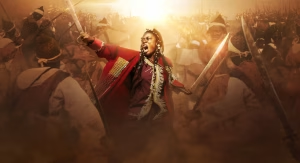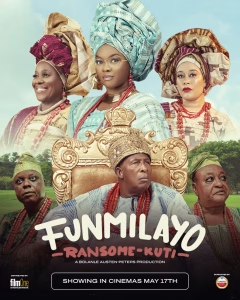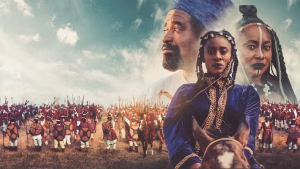Amina, Ayinla, Funmilayo Ransome-Kuti, now Wole Soyinka – Nollywood enters biopic era
As the taste of the Nollywood audience expands, helped by the rise of streaming platforms distributing this content to the world, creators in the space have begun to explore more niche but important stories.

This year, two biopics on the Nigerian Nobel laureate, Wole Soyinka, will hit cinemas – The Man Died based on the author’s book of the same title in which Wale Ojo plays him, and Wole Soyinka, directed by Joshua Ojo with Adedimeji Lateef as Soyinka.
In the past three decades, Nollywood has earned its stripes as a formidable producer of cinema and TV content, but biopics about iconic cultural figures have not been its focus. Filmmakers have been inclined to pursue safer genres – epics, romcoms, comedies, and action thrillers – easier to produce and more likely to be box office hits.
But as the taste of the Nollywood audience expands, helped by the rise of streaming platforms distributing this content to the world, creators in the space have begun to explore more niche but important stories.
In large part, the biopic gold rush is happening because distributors have seen that, at the core, Nollywood audiences want to be entertained, making producers more comfortable investing in the genre. Ojo, the creator of Wole Soyinka, said he has long been attracted to biopics. After he made Efunsetan Aniwura, a 2020 biopic on the famous slave trader, he felt more comfortable convincing distributors about Wole Soyinka.
“To some extent, producers are scared to get a no from distributors that biopics don’t sell. But I’m glad everyone is now looking towards that direction,” he told Pulse Nigeria.
This move to make biopics comes at a time of heightened awareness of African storytelling and representation by Western media. The sequel to the classic Coming to America, Coming 2 America was met with backlash by Africans who argued that everything from the accent of the Africans to the portrayal of ethnic identities, and polygamy reeks of silly Western tropes about Africa.
“Africa is a hugely diverse place, impossible to stereotype; I couldn’t tell you what Zamunda is meant to be inspired by, because it doesn’t resemble any African nation I can think of,” the writer, Allegra Frank, decried of Coming 2 America in Slate magazine.
Aside from pride in the subject of these biopics, these stereotypes are some of the sources of irritation around the portrayal of Africa writ large in Hollywood that has compelled filmmakers to forgo breaking box office records for more movies with more serious subject matters. Some of these filmmakers want to tell the stories before Hollywood hijacks them, with promises of respect for the source material that it has consistently failed to deliver.

“Our culture is rich and beautiful and I salute those who have decided to wear the shoes and to tell our history. It is a difficult task, it is more expensive to make, take it or leave it. So I salute the few ones that are celebrating our rich culture,” Ojo said.
But this is not to say the Nollywood biopics released so far have been perfect. Amina came under heavy criticism from Northern women who said the film presented a false depiction of their experience.
“I was afraid that he [the director] would not do the movie justice when I saw these words on the screen before the movie even began, ‘At a time when women were subjugated…’ Come on! We are talking about a queen who ruled men and led them to war,” Furera Bagel, a lecturer at Bauchi State University said of Amina.
Funding for research and development remains a huge problem. But the budget for a Nollywood movie in 2019 has dramatically expanded just four years later.
Plus the filmmakers behind these biopics more or less have the blessings of the subjects or their families. According to Ojo, the plot of Wole Soyinka was narrated by the author himself. Ojo said he was particularly attracted to the life of Soyinka, who will be 90 this July, because of his contributions to African literature.

“Love him or hate him Prof Wole Soyinka deserves his flowers while he’s still alive and not when he’s no longer with us. Prof is a spiritual thinker operating within dramatic and poetic rhymes,” Ojo said.
Ojo added that the genre is perfect for educating the world about Africans and African stories.“Strangers will tell our stories if we don’t. It’s time we bring Nigerian history, culture, and heritage to the forefront of our consciousness.”

